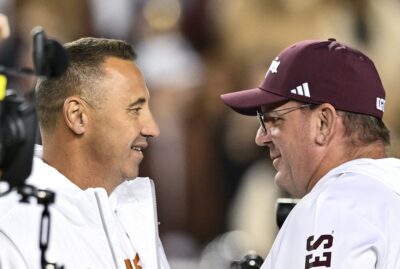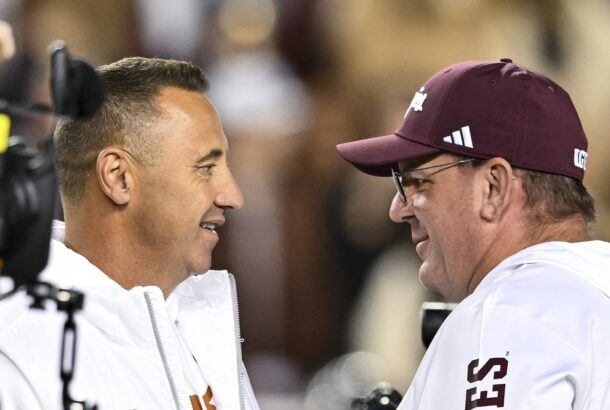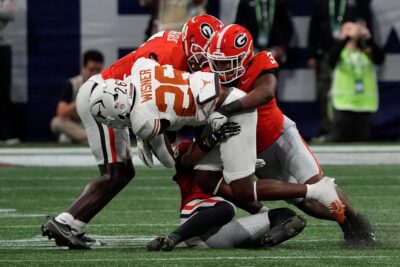Ad Disclosure

First and 10: Biggest threat to Alabama this season in the SEC West? Arkansas
By Matt Hayes
Published:
1. I don’t want to get on a soapbox, but …
The buzzword is always culture. How to build it, sustain it and eventually – when everything lines up — flourish within it.
It’s lining up at Arkansas, everyone.
“We’re in the SEC West – right where Arkansas belongs,” says Hogs coach Sam Pittman. “And we’re starting to prove it.”
The next step can only mean one thing: beat Alabama, something the Hogs haven’t done since Nick Saban arrived in 2007. Arkansas has lost 15 in a row to Saban.
At some point in the development of every SEC program, there comes a point where how you’ve built and what you’ve accomplished is judged solely on what happens when Alabama is on the other side of the ball.
It’s a brutal gut check, complete with the reality that Alabama has better players and the best coach in the history of the game. And if you can’t beat the Tide, you’ve failed.
Of the 10 SEC coaches who have beaten Saban at Alabama since 2008, only Jimbo Fisher and Kirby Smart are still coaching in the SEC. And both did it last season.
This what Pittman and Arkansas are staring at while preparing for the 2022 season. You can do everything right, and it’s still not enough.
The build-out is flawless, the buy-in is complete, the culture has been set and no one is wavering – from the president to the guy washing the practice jerseys – and odds are, it’s going to end ugly.
But there’s hope in Fayetteville, a rare convergence of fit and function and charisma that’s beginning to look a whole lot like what Dabo Swinney has accomplished at Clemson. Arkansas has always been the unpolished gem, the program with unshakeable support that only needed a coach with unbreakable will.
Ladies and gentlemen, I give you Sam Pittman. The boy who grew up in Oklahoma but loved the Hogs as a transplant — who stood outside Razorback Stadium for a glimpse of Frank Broyles and Lou Holtz and all of those Hogs heroes in Cardinal and White — has one last step in front of him as coach of his childhood dream team.
That last step is merely overcoming a dynasty unlike any other in college football history.
“We’ve come a long way,” Pittman said. “We’re not putting limitations on anything.”
Why would he? It’s a new college football world, and there are no limitations on any program – much less one with a coach who fits like few have at Power 5 programs.
The limitations of the past – inherent recruiting advantages of the SEC heavyweights – are long gone with the advent of NIL legislation. The only limitation on programs now is a lack of imagination.
Two years ago, Arkansas was trying to snap a 20-game SEC losing streak. By the end of last season, the Hogs won 9 games and had beaten rivals Texas, Texas A&M and LSU in the same season – and won a bowl game over college football blue-blood Penn State.
Four months later – after a few critical offseason moves (more on that later) — and midway through spring practice, Arkansas has the No.3-ranked 2023 recruiting class according to the 247Sports composite, and lofty expectations are as warm and welcome as those lazy summer sunsets in Northwest Arkansas that climb over the plateaus and reach into southern Missouri.
And as beautiful, too.
“Everyone is holding each other accountable,” Arkansas quarterback KJ Jefferson said. “We’re focusing on the little things that are going to separate us from every other team in the SEC.”
Including You Know Who.
2. The importance of stability
To understand the enormity of offseason moves at Arkansas is to understand the tenuous reality of turnover in the coaching industry.
Nine of the 14 SEC teams changed at least one coordinator, and every FBS team had at least 1 assistant coaching change. Only 5 of the 131 FBS teams didn’t have a coaching change.
Yet somehow, Pittman was able to keep defensive coordinator Barry Odom and offensive coordinator Kendal Briles.
Odom, the former Missouri coach, had numerous job offers, including a couple of head coaching opportunities. Briles was offered the OC job at Miami.
“The culture Sam Pittman has every day in our working environment, you can’t beat it,” Odom said. “You can’t tell me it’s better somewhere else.”
When Pittman hired Odom two years ago, he said he did so with the idea that Odom’s input on all things Hogs was critical moving forward. Pittman and Odom’s daily walks, where they talk football and organization, have become the lifeblood of the build-out.
Pittman needed to keep both coordinators, and the Arkansas administration made financial commitments to both – moving both to among the highest-paid in the SEC. Odom’s extension is worth $1.8 million annually, and Briles is at $1.2 million.
Odom’s defense was top 40 in the nation (22.9 ppg.), and Briles’ offense finished No.7 in the nation in rushing (227.7 ypg.). Pittman made it clear from Day 1 that success at Arkansas begins with running the ball with power and playing elite defense.
“It’s so important to have that stability,” Pittman said. “We’re asking our guys to commit to what we’re building, and we’re committed to them.”
3. Reshaping his game
Days after the Outback Bowl win over Penn State, Jefferson said he wanted to lose weight and gain stamina and quickness by the time spring practice began.
He wanted to fully immerse himself in Briles’ offense. More specifically, the pass offense.
The Arkansas passing game was too often limited in 2021 to hitch throws and deep routes, all with the idea of getting the ball in the hands of star wideout Treylon Burks. Intermediate throws were rare, and the passing game became predictable when the Hogs couldn’t run the ball (see: Georgia, Alabama losses).
When Briles was debating whether to take the Miami OC job, one of the determining factors in staying was working with Jefferson for a third season. He made a huge jump in Year 2 as a first-year starter, and a third year in the system could be record-breaking.
Or championship-making.
“You can’t put a price tag on that, just having that guy back with experience,” Briles said. “It would’ve been really, really hard to look at KJ and tell him I wasn’t going to be here. I love the kid and respect him so much, and want him to be able to achieve his goals.”
4. Just in case
Don’t let anyone tell you spring games are meaningless. While the 14 previous spring practices are more important for most players, spring games are quality tests for quarterbacks.
Or in the case of Alabama, the backup quarterback.
Rarely under coach Nick Sbaan has Alabama been placed into a situation of needing a backup quarterback during the season, and having only limited experience behind the starter.
It happened in one of the biggest moments of the Saban era during the 2017 season, but Tua Tagovailoa wasn’t your typical backup.
Why is this a factor now, you ask? Because star QB Bryce Young avoided a significant injury in 2021 despite a shaky offensive line (Alabama gave up 41 sacks). He was banged up in numerous games but didn’t miss time.
Alabama began this spring with just as many concerns on the offensive line – and as many at backup quarterback. That’s why this week’s spring game is important for backups Jalen Milroe and Ty Simpson.
Coaches like to see how quarterbacks react in front of the large spring crowds, and how they manage the huddle and the game. While the play calling will be basic – that’s how spring games are run – Milroe and Simpson have plenty on the line.
Milroe has taken a majority of the 2nd-team repetitions in spring practice but needs to play well in the spring game and fall camp. He must prove he has taken the next step as a thrower, and a player who can manage the game.
5. The Weekly Five
Five reasons Auburn will have better quarterback play in 2022:
1. A deeper, more talented depth chart of veterans, transfer portal additions and a midterm freshman enrollee.
2. The end of playing off schedule as the primary progression, not as a last resort.
3. Competition. Every practice in fall camp will be an adventure.
4. Protection on the line will improve, as will quarterback pocket movement and awareness.
5. Coach Bryan Harsin is more involved in coaching the position.
6. Your tape is your résumé
An NFL scout breaks down a draft-eligible SEC player. This week: Florida RB Dameon Pierce.
“His tape is good, and at times, exceptional. He’s not the fastest guy, but he’s got a burst and twitch — and he’s bowling ball out there. He runs hard, and has great feet. There’s no hesitation with him, and sometimes that can be a problem with timing. He’s a big, sturdy guy who can take a pounding, but for some reason wasn’t used that way in college. He had 9 career games in 4 seasons with 10 or more carries. Would’ve been helpful to see him carry the ball 20-25 times.
“You want to see how production increases or decreases when he’s on carry No.20. Because at that position, when it’s late and you’re running on fumes, you use football IQ as much as raw physical ability to learn from the previous 3 quarters and make plays. How does the Mike (linebacker) pursue? Does the interior front over-pursue on specific formations. You’re not seeing that with 5 carries a game. I’d be shocked if he’s not picked in the first 100 (selections). He’s an unbelievable character guy, too. Will be a stud in the locker room. ”
7. Powered Up
This week’s Power Poll, and one big thing: ranking the offensive coordinators (in some cases, head coaches run the offense despite hiring offensive coordinators).
1. Josh Heupel, Tennessee. He’s not working with 4- and 5-star recruits. The development of QB Hendon Hooker has been remarkable.
2. Todd Monken, Georgia: In the age of QB is everything, he won a national title with Stetson Bennett. Any questions?
3. Bill O’Brien, Alabama. QB Bryce Young is an elite talent (as is the rest of the offense), but don’t underestimate the value of O’Brien, an elite QB/OC in CFB and NFL.
4. Jimbo Fisher, Texas A&M: Don’t be shocked when QB Max Johnson has a monster season.
5. Mike Leach, Mississippi State: Bulldogs will eventually win 10-11 games – just like Texas Tech and Washington State did with Leach’s Air Raid offense.
6. Lane Kiffin, Ole Miss: An elite play-caller/QB developer, Kiffin eventually gave the offense to Jeff Lebby, and he’ll do the same with Charlie Weis Jr.
7. Kendal Briles, Arkansas: Made huge strides with QBs Feleipe Franks and KJ Jefferson, without veering from the principles of the Baylor 2000s offense: the power run game.
8. Eliah Drinkwitz, Missouri: Years of high-level work on offense at Missouri and App State took a step back last season. Can he get it back with a new QB?
9. Marcus Satterfield, South Carolina: Was down to QB3 by the end of 2021 and still did enough to win games. Where does it go with a significant talent upgrade in 2022?
10. Billy Napier, Florida: Made it clear Day 1 that he was coaching quarterbacks and calling plays. Worked well at Louisiana. Can it work in the SEC?
11. Rich Scangarello, Kentucky: Former NFL assistant walks into a ready-made offense with enough talent to win 10 games again.
12. Mike Denbrock, LSU: Head coach Brian Kelly will be heavily involved early, but Denbrock – like Tommy Rees at Notre Dame – eventually must make his mark.
13. Eric Kiesau, Auburn: Kiesau and Bryan Harsin worked well together at Boise State, and Harsin will be heavily involved in coaching QBs and the game plan this time around, too.
14. Joey Lynch, Vanderbilt: The QBs coach in 2021, he eventually called plays midway through last season and may have found a QB in Mike Wright.
8. Ask and you shall receive
Matt: You said Tennessee would never be great again because it couldn’t recruit now like it did under Phil Fulmer in the 1990s. Do you still believe that after Nico Iamaleava committed to coach (Josh) Heupel? — Sandra Watson, Nashville.
Sandra:
Iamaleava is a huge commitment for Heupel. More than anything, it shows Heupel’s offense is beginning to attract recruits, and that Heupel can go head-to-head with the elite of the game (Alabama) and land a potential program-defining player.
But it’s only one player, and frankly, it’s only one resume season at Tennessee for Heupel. There can’t be a step back in 2022. The Vols winning 7 games (4 SEC wins) again won’t be enough.
Fulmer had success recruiting because a majority of the other blue-bloods in the SEC (Alabama, Georgia, LSU) were in transition or cycling down through much of the mid-to- late 1990s. It was easier to go into those states and sell Tennessee.
In 1997, Fulmer was dealing with Mike Dubose (Alabama), Jim Donnan (Georga) and Gerry DiNardo (LSU) on and off the field. Heupel is currently dealing with Nick Saban, Kirby Smart and Brian Kelly at those same schools.
The only way he consistently wins in recruiting now is a unique product (Year 1 looks promising), and by winning head-to-head. Still, Iamaleava is a fantastic start at a critical position.
9. Numbers
54.4. This is where the game changes for South Carolina with new QB Spencer Rattler and WRs Antwane Wells and Corey Rucker: the Gamecocks completed 54.4% of their passes in 2021 when losing by 1 to 7 points, with 6 TDs and 5 INTs.
In other words, with games still in doubt, South Carolina quarterbacks couldn’t play efficiently enough. In fact, all 11 of South Carolina’s interceptions last season came while trailing or tied.
10. Quote to note
Kentucky QB Will Levis on the new offense with OC Rich Scangarello: “There was one drive (in the spring game) in the red zone (Scangarello) ran the same play 3 times in a row because we didn’t want to show any other concepts in the red zone. But a few of the things we did are going to be a huge part of our identity.”
Matt Hayes is a national college football writer for Saturday Down South. You can hear him daily from 12-3 p.m. on 1010XL in Jacksonville. Follow on Twitter @MattHayesCFB




